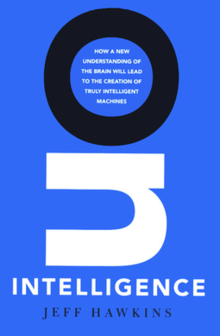On Intelligence

Front Cover
|
|
| Author | Jeff Hawkins & Sandra Blakeslee |
|---|---|
| Country | United States |
| Language | English |
| Subject | Psychology |
| Publisher | Times Books |
|
Publication date
|
2004 |
| Media type | Paperback |
| Pages | 272 |
| ISBN | |
| OCLC | 55510125 |
| 612.8/2 22 | |
| LC Class | QP376 .H294 2004 |
On Intelligence: How a New Understanding of the Brain will Lead to the Creation of Truly Intelligent Machines is a 2004 book by Palm Pilot-inventor Jeff Hawkins with New York Times science writer Sandra Blakeslee. The book explains Hawkins' memory-prediction framework theory of the brain and describes some of its consequences.
Hawkins outlines the book as follows:
The book starts with some background on why previous attempts at understanding intelligence and building intelligent machines have failed. I then introduce and develop the core idea of the theory, what I call the memory-prediction framework. In chapter 6 I detail how the physical brain implements the memory-prediction model—in other words, how the brain actually works. I then discuss social and other implications of the theory, which for many readers might be the most thought-provoking section. The book ends with a discussion of intelligent machines—how we can build them and what the future will be like. (p. 5)
The first chapter is a brief history of Hawkins' interest in neuroscience juxtaposed against a history of artificial intelligence research. Hawkins uses a story of his failed application to the Massachusetts Institute of Technology to illustrate a conflict of ideas. Hawkins believed (and ostensibly continues to believe) creating true artificial intelligence will only be possible with intellectual progress in the discipline of neuroscience. Hawkins writes that the scientific establishment (as symbolized by MIT) has historically rejected the relevance of neuroscience to artificial intelligence. Indeed, some artificial intelligence researchers have "[taken] pride in ignoring neurobiology" (p. 12).
Hawkins is an electrical engineer by training, and a neuroscientist by inclination. He used electrical engineering concepts as well as the studies of neuroscience to formulate his framework. In particular, Hawkins treats the propagation of nerve impulses in our nervous system as an encoding problem, specifically, a future predicting state machine, similar in principle to feed-forward error-correcting state machines.
...
Wikipedia
